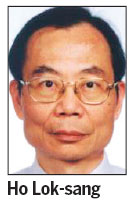HK's greatest threat and greatest hope
Updated: 2013-06-28 07:40
By Ho Lok-Sang(HK Edition)
|
|||||||
More and more people are worried about Hong Kong. The city's rate of economic growth has been slipping, and has not maintained the perceived long-term average rate of around 5 percent, which itself is far below the average of around 8 percent from the 1960s through the 1980s. Hong Kong's per capita GDP is now about one-third less than that of Singapore.
We are witnessing declines in Hong Kong's competitiveness. This is so notwithstanding the still impressive ratings given by such reputable bodies as the IMD in Switzerland and the World Economic Forum, and more recently by the China City Competitiveness Research Association. But Hong Kong people have become increasingly indifferent to these developments, perhaps for a good reason. To many Hong Kong people, achieving high per capita GDP is not as important as achieving happiness. Having a high level of income is not as important as having a fulfilling life and harmonious family life. This shift in values is good, and paradoxically is Hong Kong's greatest hope for a better tomorrow.
I have been studying Hong Kong people's happiness since 2005, and have found Hong Kong people's happiness highly resilient. Economic ups and downs certainly still matter, but matter less than before. Hong Kong people have learnt economic growth is desirable only in so far as it promotes happiness. This change in Hong Kong people's values offers the greatest hope for Hong Kong to emerge as a truly successful city.

However, Hong Kong is also under threat, and I am truly worried. This threat is not due to the rising competitiveness of cities on the mainland. Thus I am not worried about Shanghai and other cities competing away our businesses. As an economist, I believe in comparative advantage: there will always be something that we can do better than others. To me, we only need to do the best we can: focusing on those things that we do well, and work hard and work intelligently. But two things really worry me: "internal strife" and "arrogance".
Internal strife undermines our social capital. Arrogance undermines our mental capital. These are the real threats to Hong Kong's development. As it happens, internal strife and arrogance are twins.
Internal strife is not the same as disagreement. There is always room and always some ground for disagreement. Disagreement and open dialogue help us find a better way of doing things. Internal strife, on the other hand, is not about finding a better way of doing things, but about doing things "my way". Unfortunately, there are too many people who insist their way of doing things is best. They refuse to listen and refuse to talk. Their arrogance makes it very difficult for them to accept other people's views, however well reasoned.
In public debates, a lack of trust and mutual respect is undermining reasonable discourse. Some even pour abusive language on those who disagree with them. What is worrying is that many of the younger generation are fast acquiring such arrogance, and some teachers, instead of giving them advice to be humble and to reason, even applaud their arrogance.
Such is the environment in which our SAR government finds itself, and we can all appreciate how difficult it is for it to govern.
As readers can tell from many columns published in China Daily and elsewhere, I have openly criticized many of the government's policies. I believe it is perfectly fine for students and indeed anyone to criticize the government if they believe the government has done something wrong. In Hong Kong, it is also perfectly fine for citizens to rally and demonstrate for a cause that they believe in, so long as they stay within the bounds of the law. But it will be wrong to try to impose one's views on others. I have almost always been disappointed because almost all of my policy proposals have not been acted upon by the government. But I will never lose heart. I just keep making the points that I believe are right. It is citizens' prerogative to express their views. It is the government's prerogative to make policies.
Just as citizens should have an open mind, so should the government. I have learnt to change many of my views on various policies. Ideas keep developing, and I witness how much progress I have made over the years. This will not happen if I believe I am always right and others are always wrong. Let love and peace and enlightened minds occupy Hong Kong. Arrogance and internal strife then will give way to a better city.
The author is director of the Center for Public Policy Studies at Lingnan University.
(HK Edition 06/28/2013 page7)